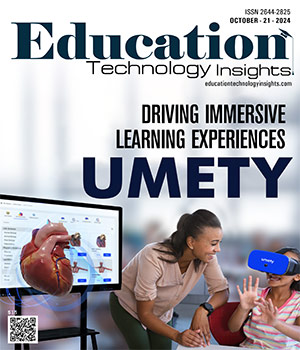THANK YOU FOR SUBSCRIBING
Be first to read the latest tech news, Industry Leader's Insights, and CIO interviews of medium and large enterprises exclusively from Education Technology Insights
AI-driven Programs Drive Student Success for Business courses
Dr. SinjiniMitra, Associate Professor, Information Systems and Decision Sciences (ISDS) Department, California State University Fullerton
 Dr. SinjiniMitra, Associate Professor, Information Systems and Decision Sciences (ISDS) Department, California State University Fullerton
Dr. SinjiniMitra, Associate Professor, Information Systems and Decision Sciences (ISDS) Department, California State University FullertonArtificial Intelligence (or AI) is an area that is finding widespread use in different industries today, from security to healthcare to education. It is an interdisciplinary field that leverages techniques from the domains of computer science, statistics, mathematics, and machine learning to devise complex algorithms for analyzing data and making effective business decisions.
Higher education today is rich in data, consisting not only of student academic records but also information about students’ demographics and background, engagement in different curricular and co-curricular activities, utilization of various kinds of academic and support resources, engagement and usage of the learning management system (or LMS) which is used in delivering courses in most academic institutions today, among others. Given the availability of such rich and critical data and that of technology and software to analyze such large and complex datasets, colleges and universities around the world are increasingly using AI to gain deeper insights into factors that affect student performance and success and hence develop programs to further enhance student learning outcomes and shorten graduation times.
At California State University Fullerton, we have extensively used AI to identify factors that have an impact on performance of students in traditionally difficult courses (often termed “bottleneck” courses) with the goal of introducing additional intervention and support services to help students at risk improve their chances of successful completion of courses and eventually earn their degrees in a timely manner. Our studies have involved not only academic and demographic factors, but also cognitive, behavioral, and motivational factors that are equally important in understanding student behavior and their consequent performance, along with their propensity to seek help and resources in case of difficulties. Studying so many different factors together in the context of higher education was a challenging task owing to the underlying complexity due to the different nature of the variables that were accomplished via AI-driven models. Further, we analyzed and compared student performance across different learning environments, such as traditional face-to-face and online, and discovered that different groups of factors play a role in student performance across these different class formats. These findings have led our College to implement several programs like Supplemental Instruction (or SI) that are aimed at providing additional support to students. Such initiatives have led to considerable improvement in the overall passing rate of multiple bottleneck courses in the Business discipline. Currently, we are also exploring the application of AI to a large-scale study of all Business students to identify which factors (academic, demographic, co-curricular) contribute to the non-retention of students in their freshmen year (where we typically see maximum attrition on our campus).
The power of AI in improving education via harnessing the information contained in data is vast – not only have we been able to utilize the knowledge gained to improve student learning, but the findings have provided valuable feedback to instructors to redesign their courses to suit students with differing learning behaviors. For example, instructors teaching both traditional and online courses now understand which students are more likely to succeed in each class format and hence develop course materials accordingly to maximize the chances of students to succeed in both. Moreover, instructors are also sometimes provided with a list of at-risk students in the middle of the semester identified via our models so that they can reach out to them to offer extra help. Thus, AI has significantly changed the education landscape today on our campus as well as in other universities. As technology keeps on improving daily with new software platforms, data storage services (cloud technologies, for instance), it offers a more significant promise to drive student success in the future by informing students, faculty, and administrators alike.
Weekly Brief
Featured Vendors
Read Also
Active Engagement is the Foundation of Effective Leadership
4 Keys to Managing Change
Empowering Leadership through Innovation in Higher Education
Redefining Readiness: A Path Toward a Technology-Agnostic Future
The New Era of Education
The Indispensable Role of Emotional Intelligence in K-12 Technology Leadership

I agree We use cookies on this website to enhance your user experience. By clicking any link on this page you are giving your consent for us to set cookies. More info

























